英国历史与文化_英文版
英国的历史与文化ppt课件
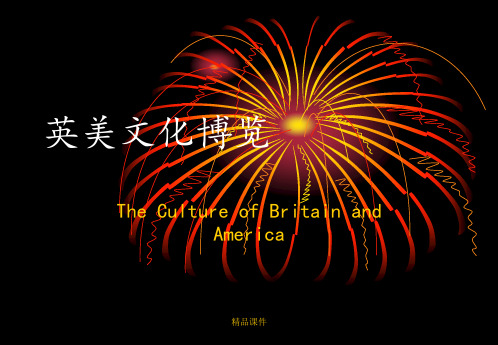
英国外交
• 强调加强外交与安全政策的协调,成立由首 相直接领导的国家安全委员会;主张保持英 核威慑力量;将阿富汗问题列为外交第一要 务;巩固英美“特殊关系”;积极推进英在 欧盟的利益,重申英不加入欧元区、未经公 投不向欧盟让渡主权的立场;加大与中国、 印度等新兴力量的接触力度;呼吁推动通过 “两国方案”解决巴以冲突;重视国际发展 问题,坚持将国内生产总值的0.7%用于海外 援助目标。
• 五、英国教育
• 1.英国公学
• 2.牛津大学,剑桥大学,伦敦大学
• 六、英语语言与英国文学
• 1.英语的世界地位
• 2.英语英语的发展
• 3.英语词汇的来源
• 4.英国文学
精品课件
英国的名称
• Britain • Great Britain • the United Kingdom 【UK】 • England • The British Isles
• 所有这些都可以指代英国,然而都不太全面。UK是在联合国使用的名称, 是the United Kingdom lf Great Britain and Northern Ireland(大 不列颠及北爱尔兰联合王国)的简称。
精品课件
英国概况
• 大不列颠及北爱尔兰联合王国的国 土总面积为24.4万平方公里,总人 口为5800万。英国的地理位置非常 优越。
精品课件
英国简况
• 岛国,位于欧洲西部,由大不列颠岛(包括英格兰、 苏格兰、威尔士)、爱尔兰岛东北部和一些小岛组 成。隔北海、多佛尔海峡、英吉利海峡与欧洲大陆 相望。海岸线总长114英5国0公概况里。属海洋性温带阔叶 林气候。通常最高气温不超过32℃,最低气温不低 于-10℃。北部和西部的年降水量超过1100毫米, 其中山区超过2000毫米,中部低地为700-850毫米, 东部、东南部只有550毫米。每年2-3月最为干燥, 10月至翌年1月最为湿润。
英国简介(英文版)
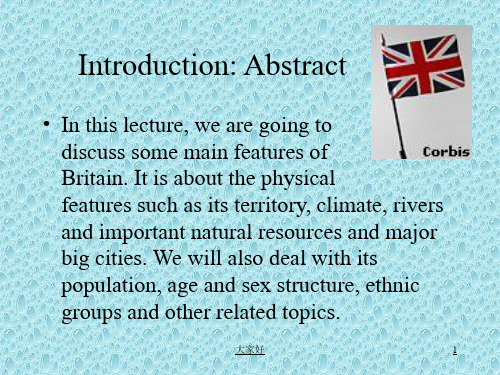
大家好
12
Ben Nevis
大家好
13
Severn River
大家好
14
Thames River
• 泰晤士河(Thames River)是英国著 名的“母亲”河。发源于英格兰西南 部的科茨沃尔德希尔斯,全长402公 里,横贯英国首都伦敦与沿河的10多 座城市,流域面积13000平方公里, 在伦敦下游河面变宽,形成一个宽度 为29千米的河口,注入北海。在伦敦 上游,泰晤士河沿岸有许多名胜之地, 诸如伊顿、牛津、亨利和温莎等。泰 晤士河的入海口充满了英国的繁忙商 船,然而其上游的河道则以其静态之 美而著称于世。在英国历史上泰晤士 河流域占有举足轻重的地位。同时加 拿大安大略省也有一条河流叫“泰晤 士河”。
• Two main islands: Great Briroduction to British and Amer大ic家an好Culture
8
British Isles
• northwest of Europe in the Atlantic Ocean • two large islands (Great Britain and Ireland) and
Britain.
大家好
3
Before You Read
Warm-up
• Can you see a big clock in the picture on the right? Do you know its very famous name?
_____________________________
hundreds of small islands
大家好
9
• The British Isles are made up of two large islands-Great Britain (the larger one) and Ireland, and hundreds of small ones.
英国历史与文化 (公选课)试卷及答案
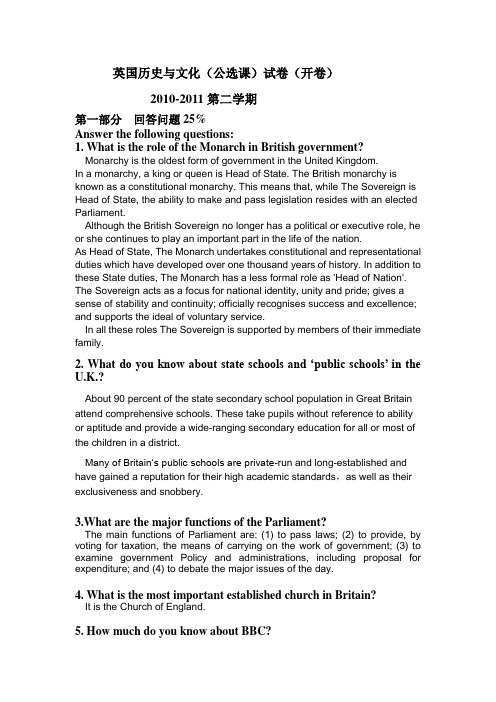
英国历史与文化(公选课)试卷(开卷)2010-2011第二学期第一部分回答问题25%Answer the following questions:1. What is the role of the Monarch in British government?Monarchy is the oldest form of government in the United Kingdom.In a monarchy, a king or queen is Head of State. The British monarchy is known as a constitutional monarchy. This means that, while The Sovereign is Head of State, the ability to make and pass legislation resides with an elected Parliament.Although the British Sovereign no longer has a political or executive role, he or she continues to play an important part in the life of the nation.As Head of State, The Monarch undertakes constitutional and representational duties which have developed over one thousand years of history. In addition to these State duties, The Monarch has a less formal role as 'Head of Nation'. The Sovereign acts as a focus for national identity, unity and pride; gives a sense of stability and continuity; officially recognises success and excellence; and supports the ideal of voluntary service.In all these roles The Sovereign is supported by members of their immediate family.2. What do you know about state schools and ‘public schools’ in the U.K.?About 90 percent of the state secondary school population in Great Britain attend comprehensive schools. These take pupils without reference to ability or aptitude and provide a wide-ranging secondary education for all or most of the children in a district.Many of Britain…s public schools are private-run and long-established and have gained a reputation for their high academic standards,as well as their exclusiveness and snobbery.3.What are the major functions of the Parliament?The main functions of Parliament are: (1) to pass laws; (2) to provide, by voting for taxation, the means of carrying on the work of government; (3) to examine government Policy and administrations, including proposal for expenditure; and (4) to debate the major issues of the day.4. What is the most important established church in Britain?It is the Church of England.5. How much do you know about BBC?The British Broadcasting company (English: Broadcasting Corporation), abbreviation is, is a British BBC funded by the government but the independent operation of public media, has long been considered the most respected global one of the media. In a long time, the BBC has monopolized British television and radio. In 1955 the itv and founded in 1973, before British independent radio stations all over Britain BBC has been the only television, radio broadcasting company. Today is a global except in BBC with high visibility of the media, and also provides all kinds of other services, including books, newspapers and magazines, English teaching, a symphony orchestra and the Internet news service.二.解释短语Explain the following terms:25%1.The United KingdomBritish full name is the United Kingdom of Great Britain and Northern Ireland, is from England, Scotland, wales and Northern Ireland constitute the United Kingdom, the unification of the central government and in a head of state. Britain is located in continental Europe in Great Britain, the British home anybody by beihai, British Isles, Celtic sea, across the English channel, surrounded by the Atlantic ocean and the Irish sea. Land area 24.36 square kilometers and a population of about 60 million. Britain is the world's first industrialised countries is a culturally diverse and opening-up thoughts of society. Capital London is Europe's largest and most international characteristic city.2. “Shadow Cabinet”The Shadow Cabinet is a team of fictional superheroes created by Milestone Comics and published by DC Comics. They first appeared in Shadow Cabinet #0 (January 1994), and were created by Dwayne McDuffie, Robert L. Washington III and John Paul Leon. Almost all of the original run, issues #4-11 and #13-17, were written by Matt Wayne.3. Compulsory educationCompulsory education is according to legal provision, school-age children and adolescents have to accept, the state, society, families of national education must be guaranteed. Its essence is national in accordance with legal provisions for school-age children and adolescents particular fixed number of year of the implementation of the education system of the force. Compulsory education say again forced education and free compulsory education. Compulsory education have mandatory, free sex, universality characteristic. Our obligations prescribed in the compulsory education law education of schooling for nine years, this stipulation conforms to China's national conditions, is adequate.4. Constitutional MonarchyA constitutional monarchy is a form of constitutional government, where either an elected or hereditary monarch is the head of state, unlike in an absolutemonarchy, where in the king or the queen is the sole source of political power, as he or she is not legally bound by the constitution. Most constitutional monarchies have a parliamentary system (Australia, Belgium, Cambodia, Canada, Denmark, Japan, Malaysia, Netherlands, New Zealand, Norway, Spain, Sweden, Thailand, United Kingdom) in which the monarch is the head of state, but a directly- or indirectly-elected prime minister is head of government. Although contemporary constitutional monarchies mostly are representative, parliamentary systems, or constitutional democratic monarchies,[citation needed] they have co-existed with fascist andquasi-fascist constitutions (Italy, Spain) and with military dictatorships.5. Boxing DayBoxing Day is a bank and public holiday commonly occurring on 26 December. It is observed in the United Kingdom, Australia, Canada, Ghana, Switzerland, Germany, Sweden, Norway, Greenland, Netherlands, New Zealand, Hong Kong, Nigeria, Kenya, Guyana, Trinidad & Tobago, Jamaica and other countries in the Commonwealth of Nations with a mainly Christian population. In South Africa this public holiday is now known as the Day of Goodwill. Though it is not an official holiday in the United States, the term "Boxing Day" is used by some Americans, particularly those that live near the Canada –United States border. In Canada, Boxing Day is listed in the Canada Labour Code as a holiday.[1][2] It is not an official holiday in Quebec or British Columbia.第三部分:Choose the answer that best completes the statement or answers the question:50%1. Which of the following book is written by Geoffrey Chaucer? AA. The Canterbury Tales.B. Beowulf.C. King LearD. Morte D‟Arthur.2. which of the following was NOT one of the three forces that led to the Modern Development of Europe? DA. The growth of capitalismB. The RenaissanceC. The Religious ReformationD. The spiritual leadership of the Roman Catholic Church3. Which of the following is not considered a characteristic of London?A. The cultural centre. DB. Business centreC. The financial centre.D. the sports centre.4. Who are the ancestors of the English and the founders of England?A. The Anglo-Saxons. AB. The Normans.C. The Vikings.D. The Romans.5. Which is the largest city in Scotland? CA. Cardiff.B. Edinburgh.C. Glasgow.D. Manchester6. Which of the following is Not a characteristic of the British government? AA. It offers the Queen high political status and supreme power.B. It is both a parliamentary democracy in the world.C. It is the oldest representative democracy in the world.D. It has no written form of Constitution.7. Which of the following kings was executed in the civil war? AA. James IB. James IIC. Charles I.D. Charles II.8. Under whose reign was the Bill of Rights passed? BA. James II.B. William of OrangeC. Oliver Cromwell.D. George I.9.Which group of people cannot vote in the general election? BA. Members in the House of Commons.B. Lords in the House of Lords.C. The UK Citizens above the age of 18.D. The UK resident citizens of the Irish Republic.10.By whom is a “vote of no confidence” decided? DA. The house of Commons.B. The house of Lords.C. The two major parties.D. The Prime Minister.11. The long poem ___C__ in Anglo-Saxon perio d was termed England‟snational epic.A. The Canterbury TalesB. Paradise LostC. The Song of BeowulfD. The Fairy Queen12. Among the great Middle English poets, Geoffrey Chaucer is known for his production of___D_.A. Piers PlowmanB. Sir Gawain and the Green KnightC. Confessio AmantisD. The Canterbury Tales13. ___A____ is regarded as the father of English poetry.A. Geoffrey ChaucerB. Edmund SpenserC. John MiltonD. D. Wordsworth14. Generally, the Renaissance refers to the period between ______ and ______ centuries. AA. 14th...mid-17thB. 14th...mid-18thC. 16th...mid-18thD. 16th...mid-17th15.Shakespeare‟s greate st tragedies are ___A____.A. Hamlet, Othello, King Lear and MacbethB. Hamlet, Othello, King Lear and Romeo and JulietC. Hamlet, Coriolanus, King Lear and MacbethD. Hamlet, Julius caesar, Othello and Macbeth16. The sentence “Shall I compare thee to a summer‟s day?” is the line of oneof Shakespeare‟s___D_A. comediesB. tragediesC. historiesD. sonnets8.17. The 18th century England is known as the ____C__ in the history.A. RenaissanceB. ClassicismC. EnlightenmentD. Romanticism.18. The greatest of Scottish poets was ____A__.A. Robert BurnsB. George CrableC. O. GoldsmithD. Thomas Gray19. The greatest English critical realist novelist was ___B____, who criticizedthe bourgeois civilization and showed the misery of the common people.A. William Makepeace ThackerayB. Charles DickensC. Charlotte BronteD. Emily Dickinson20. The longest river in Britain is ___C__.A. the ClydeB. the MerseyC. the SevernD. the Thames21.Which part of Britain is always fighting____D___?A. EnglandB. ScotlandC. WalesD. Northem Ireland22. The first inhabitants in Britain were __C___.A. the NormansB. the CeltsC. the IberiansD. the Anglo-Saxons23. British Recorded history began with __A___.A. Roman invasionB. the Norman ConquestC. the Viking and Danish invasionD. the Anglo-Saxons invasion24. Christmas Day in __B__, Duke William was crowned in Westminster Abbey.A. 1056B. 1066C. 1006D. 106025.___A__ was famous for his abdication because of his marriage with adivorced Ame was famous for his abdication because of his marriage with a divorced American:A. Edward VIIIB. Edward VIIC. George VID. George VII。
高二英语英语国家历史与文化背景介绍练习题50题
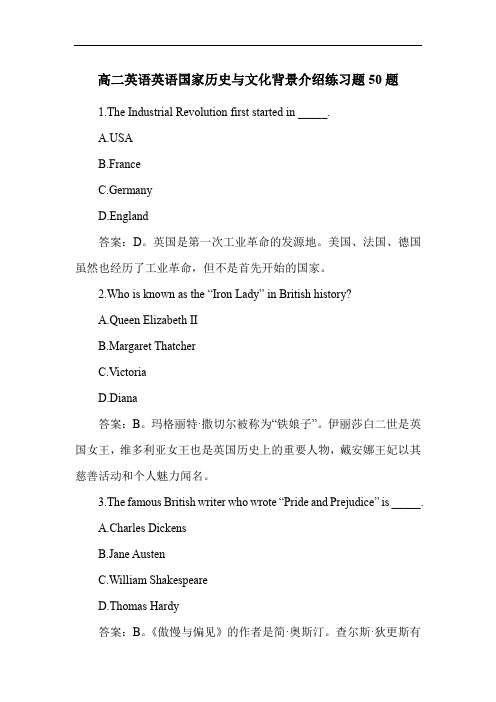
高二英语英语国家历史与文化背景介绍练习题50题1.The Industrial Revolution first started in _____.AB.FranceC.GermanyD.England答案:D。
英国是第一次工业革命的发源地。
美国、法国、德国虽然也经历了工业革命,但不是首先开始的国家。
2.Who is known as the “Iron Lady” in British history?A.Queen Elizabeth IIB.Margaret ThatcherC.VictoriaD.Diana答案:B。
玛格丽特·撒切尔被称为“铁娘子”。
伊丽莎白二世是英国女王,维多利亚女王也是英国历史上的重要人物,戴安娜王妃以其慈善活动和个人魅力闻名。
3.The famous British writer who wrote “Pride and Prejudice” is _____.A.Charles DickensB.Jane AustenC.William ShakespeareD.Thomas Hardy答案:B。
《傲慢与偏见》的作者是简·奥斯汀。
查尔斯·狄更斯有很多著名作品如《《双城记》等,威廉·莎士比亚的作品有《《哈姆雷特》等,托马斯·哈代的作品有《德伯家的苔丝》等。
4.The British national flag is known as _____.A.TricolorB.Star-Spangled BannerC.Union JackD.Maple Leaf答案:C。
英国国旗是米字旗,即Union Jack。
Tricolor 是法国国旗等三色旗的统称,Star-Spangled Banner 是美国国旗,Maple Leaf 是加拿大国旗的标志枫叶。
5.The Battle of Hastings in 1066 led to the Norman Conquest of _____.A.EnglandB.ScotlandC.WalesD.Ireland答案:A。
英国历史与文化
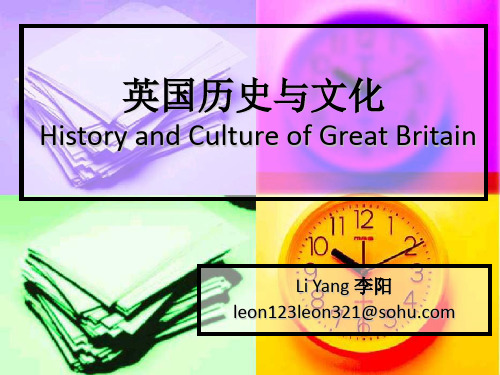
Cities
London Birmingham Glasgow Liverpool Manchester Edinburgh Belfast Bath
London
Glasgow
Liverpool
Manchester
Edinburgh
Belfast
Bath
The Celts
Its origin Ancestors of modern Scottish (Briton), Welsh and Irish (Gael). The word “Celtic” refers to a language, not a race or a culture, but the language left few traces behind it. Celtic transformed British life. They brought iron, introduced the use of money, founded kingdoms, and created a new art. Celtic arts: influenced by Greek, Scythia and Rome. A Celtic Romance
Roman Britain: 55 B.C- 450
55 B.C.E, two Roman legions, some 10000 men, sailed from Boulogne in 80 ships, led by Julius Caesar, reaching Dover. Hadrian’s Wall The end of the Roman Rule -409A.D Romanization: urbanization (20-38 Roman towns); the rule of law (towncouncil-magistrates); Latin Culture; Christianity Influence: Roman brought Great Britain from prehistory to history.
Unit 4 History and traditions 教案

课题名称 : 人教版(2019)英语必修二Unit4 Reading and Thinking
授课教师
授课年级
高一
一、教学内容分析
本板块的主题是“通过历史了解一个国家的概况”(Learn about a country through history )。学生迪过阅读英国历史的简要发展进程,了解英国地理、社会及文化概况,并深入思考历史与社会文化之间的关系。英国是最主要的英语国家之一,有着悠久的历史和文化,而英语语言也正是在这种历史和文化中产生的,所以英语语言富有鲜明的英国文化特征。因此,学习英语必然要了解英国文化,了解英国文化也会对学习英语起到促进作用。
二、学情分析
本课授课对象为高一平行班学生,高一的学生已经有了一定的词汇基础,掌握了一定高中英语学习的方法。但是大部分学生还缺少自主学习能力,和举一反三的能力。学生对于英国历史不太熟悉,对文本理解会略显困难。学生可能掌握不了看英文地图的要领。在讨论开放性问题时,学生可能无法用英语准确地表述出自己的想法。因此教师需要降低教学环节的难度设置,并且需要多引导学生。
According to a timeline, teacher asks students to find out the keys words and finish the timeline.
Activity 3: Read paragraph 3 and fill in the blanks.
Activity 5: Show students the complete timeline and review it by watching a video.
TheUnitedKingdom英国介绍详细中英文
The United Kingdom, including Great Britain (England, Wales and Scotland "and Northern Ireland, is a member of the European Community 12. Its full name is the United Kingdom.Britain is the British Isles by the majority of islands, of which the largest islands are Great Britain, the second largest island Northern Ireland and the Irish Republic. The west coast of Scotland there is a large islands called the Hebrides. Native north-east coast of Scotland Orkney Islands, Shetland Islands, and Samoa. Of these islands with the mainland have administrative relations, but the Irish Sea between Great Britain and the Isle of Man and the Channel Islands between France is largely autonomous and not an integral part of the United Kingdom.The United Kingdom area of approximately 242.5 thousand square kilometers (93600 square miles), from the south coast to Scotland is almost the most northern part of nearly 1,000 kilometers (about 600 miles), nearly horizontal at its widest point about 500 kilometers (about 300 miles)."Britain" the term originated in the Greek and Latin words, which may eventually be traced back to Celtic. Although the use of "Prehistoric" This yardstick to measure, the Celtics went to the British Isles is also a later (and before that had created those civilizations such as the Avebury stone circle Stonehenge construction sites and Such well-known historical monuments), but the history of written records relating to England, after all, about the Celtics from the start. "Celtic" This phrase is very common and regularly used to distinguish the early inhabitants of the British Isles and later the Anglo - Saxon invaders.The Romans ruled from AD 43 onwards lasted 300 years. The Romans in 408 before the final withdrawal of the island were from Northern Europe began to Angles, Saxons and Jutes intrusion, has undergone a period of growing chaos. "England" is the word from the "Angles" came. Over the next two centuries, and gradually became a settler harassment and the establishment of a number of small kingdom. British people in today's Wales and Cornwall Regional Independent survive. These small kingdom there was relatively strong to dominate the country's kingdom, first in the North (Northumbria Kingdom), and then in the central (the Kingdom of Mercia), and finally in the south (Wessex kingdoms). However, from the Scandinavian Vikings then invaded England and settled down, although in the 10th century Wessex dynasty, beat off the invading Danes and for a time to dominate the vast region of England.In 1066 took place on the last successful invasion of England. Duke William of Normandy in the Battle of Hastings defeated the British, the Normans from France and others come here to settle. In the ensuing three centuries, the French became the language of nobility, the legal structure has been the English Channel on the other side of the passage of that set of consequences, and social structure, to some extent been affected.Wales, though often in England within the sphere of influence, but has been a bastion of Boston. However, in the Prince Llewellyn was killed in 1282, after Edward I waged a battle and victory to put England under the rule of Wales. Welsh nationalist sentiment continues to rise, the beginning of the 15th century rebellion led by Owen Gerlind illustrated this point. In 1536 and in 1542 a joint decree to England and Wales in the administrative, political and legal integration into one.Originally lived in Scotland most of Picts. The 6th century, the Scots from Ireland to settle in today's Argyll area. Lothian home to England, while others continue to go north Wales, Britain came to Strathclyde. The 9th century, the various regions of Scotland to unite against Viking. Throughout the Middle Ages, when England's monarchy has always been a powerful threat to Scotland's independence.England and Scotland, the joint that eventually, when the religious differences of the ethnic hatred in the past than the more crucial. In England, Elizabeth I in 1603 by James VI of Scotland (James I of England) to the throne. Even so, England and Scotland in addition to Oliver Cromwell's rule was once forced to bring together, in the 17th century they have been independe nt of each other. To 1707, aware of a closer political and economic union benefits, the two sides agreed to establish a single British Parliament. Scotland retained its own legal system and religious communities. But in George I and George II of Hanover, two Protestants during the reign of the royal family of England and Scotland, the relationship between the nervous and James II, has launched two rebellions revolutionaries to try to restore the Catholic House of Stuart.Ireland before the Christian era there were many of the Kingdom, but Ireland is not immune from a violation of Viking, to the 10th century AD, when, suddenly became a Viking pre-eminence.Henry II of England in 1169 to launch the invasion of Ireland. England Ji Pope Adrian IV, Henry II granted the powers of the supreme ruler, because he was anxious to make Irish church fully compliant Rome. Fell in most parts of Ireland, Anglo - Norman power and privilege in the hands, but in medieval England, almost no direct exercise of jurisdiction in this.Tudor monarchs of several interventions in Ireland tend to be much stronger. In the reign of Elizabeth I, the Irish rebels launched a series of battles. 'Resistance Movement, mainly concentrated in the northern province of Ulster, 1607, due to the failure of the resistance movement as well as leaders of the exodus of Ulster from Scotland and England into areas inhabited by immigrants.As the English Civil War (1642 ~ 1652), Ireland was attacked by a number of uprisings, but have been Cromwell suppressed. 1688 James II was spent dim after the war between England and Ireland is constantly. 18th century, most of them are fragile peace. 18 century, the British Government has made various efforts to seek stability. In 1782, the Irish Parliament (established in the Middle Ages) to obtain legislative autonomy; in the Constitution than withBritain the only major link is to the Royal Government. However, the Parliament represents just a small number of Anglo - Irish privileged class, Catholics were excluded. In 1798 an uprising took place, but without success;in 1801, Ireland and Great Britain combined into one.Although the 1916 uprising in Dublin, the national insurrection was crushed, but in the First World War-stage, a stream known as the Irish Republican Army guerrilla forces began military action against the British authorities. In 1920 the Government of Ireland Act passed to set up two local government councils,one based in Dublin and one in Belfast. The Act was implemented in 1921 in Northern Ireland, Ulster Province, nine counties have six received their own parliament, while still have seats in the British Parliament, and subject to the jurisdiction of the British Parliament the highest. However, the Irish Republican Army continues to fight for the South to win its independence from Britain inthe fight. In June 1921 after the signing of an armistice agreement, accordingto conclude in December the same year, the British - Irish Treaty the Irish Free State was established in 1949, the Free State became the Republic of Ireland.Channel Islands and the Isle of Man, although not belonging to the United Kingdom, but have a special relationship with the United Kingdom. Channel Islands during the 10th century and 11th century part of the Duchy of Normandy. Isle of Man has been nominally in 1266 prior to the exercise of sovereignty by Norway to the 1765 final was governed directly by the Government of the Kingdom. Today, the Channel Islands and the Isle of Man have their own legislative bodies and the legal system, where the British Government is responsible for defense and international relations.翻译:英国包括大不列颠(英格兰、威尔士和苏格兰〉和北爱尔兰,是欧洲共同体12个成员国之一。
英国的古老历史和文化介绍英文
英国的古老历史和文化介绍英文The United Kingdom, a land steeped in history, is home to a rich tapestry of cultural heritage. From the ancient stone circles of Stonehenge to the towering walls of Hadrian's Wall, the UK's past speaks volumes of its storied past.The British Isles have witnessed the rise and fall of empires, with the Roman, Saxon, and Viking influences leaving indelible marks on its landscape. Castles dot the countryside, each with its own tale of valor and intrigue, standing assilent sentinels to the nation's tumultuous history.The Gothic architecture of Westminster Abbey and the grandeur of Buckingham Palace are testaments to the country's royal lineage. These edifices not only serve as the backdrop for royal ceremonies but also as symbols of British tradition and continuity.Literature, too, has played a pivotal role in shaping British culture. The works of Shakespeare, Dickens, and the Brontë sisters have immortalized the essence of British life, from the pomp of the monarchy to the struggles of the common man.Music, from the classical compositions of Elgar to the revolutionary sounds of The Beatles, has also contributed to the UK's cultural mosaic. The British music scene continuesto evolve, reflecting the nation's dynamic and diversesociety.The UK's cultural landscape is further enriched by its vibrant festivals and celebrations. From the pageantry of the Changing of the Guard to the revelry of Glastonbury, these events encapsulate the spirit of the British people and their love for tradition and innovation.In conclusion, the United Kingdom's history and culture are as complex and multifaceted as the people who call it home. Its ancient landmarks, royal traditions, literary treasures, and musical evolutions paint a picture of a nation that is both deeply rooted in its past and constantly looking towards the future.。
《英国历史英文版》课件
World War II saw Britain stand
economic changes in the
alone against Nazi Germany, and
subsequent years.
the country's bravery in the face of
the Blitz remains an enduring
Stuart Era
James I and the Gunpowder Plot
King James I faced numerous challenges during his reign, including the infamous Gunpowder Plot in 1605.
Charles I and the English Civil War
Innovation and technological advancements led to a seismic shift in the way goods and services were produced, transforming the British economy and society adernize the country.
The decision to leave the European
Union in 2016 has plunged Britain
into years of uncertainty and
debate, as the country grapples
Victorian Era
Queen Victoria and the British Empire
Queen Victoria's reign marked the height of British power and influence, as the country enjoyed unprecedented prosperity and global supremacy.
英语的发展史(中英文版)
一种民族语言(包括词汇)的发展与民族的历史密切可关。
要了解英语语汇的发展史,不可避免地跟整个英语的发展史,乃至英国的历史密不可分。
不列颠群岛的最早居民是凯尔特人,又称不列颠人。
公元前55年,罗马人在凯萨大帝的率领下侵入不列颠群岛,凯尔特人被罗马人赶入威尔士和苏格兰的深山之中。
直到公元410年,罗马占领时期才告结束。
随后,来自德国北部平原的三个日耳曼部落盎格鲁人,撒克森人和朱特人开始来到不列颠定居。
英语就是盎格鲁—撒克森人的语言。
语言史学家一般把英语的历史分为三个时期:1、古英语时期,2、中古英语时期,3、现代英语时期。
1、古英语时期(又称盎格鲁-萨克森时期公元450—1100年)日尔曼部落在不列颠定居后,名自占领一些地区。
盎格鲁人占领了泰晤士河以北的英格兰的大部分地区和苏格兰的低地,朱特人占领了肯特郡一带地区,撒克森人占领了泰晤士河以南的大部分地区。
各个部落建立了一些小王国,出现了英国历史上的七国时代。
直到公元830年,阿尔弗雷德大王才统一了整个英格兰地区。
由于全国长期没有统一,所以古英语时期存在着多种方言,主要方言有四种:西萨克森语,肯特语,莫西亚语和北恩布里亚语。
这四种方言都曾一度占主导地位。
西撒克森语保存下来的手搞最多。
其它方言在形成英语的过程中也起过很重要的作用。
古英语的词汇有着浓厚的日尔曼语族的特点。
这主要表现为复合法是重要的构词方法。
复合词在古英语词汇中占有显著的地位。
据统计,在史诗《贝奥武夫》3183行诗句中,竟有1069个复合词。
有些复合词中不重读部分,渐渐失去了独立地位,而演变成了词缀,如for-, in-, -ful 等派生法在古英语中也广泛使用。
共有二十四个名词后缀、十五个形容词后缀,-dom, -hood, -ship, -ness, -the, -ful,- ish 等词缀都可溯源到古英语时期。
古英语时期的诗歌有一种特殊的修辞手法,即头韵(alliteration),由此产生的许多短语一直保留到现在,如night and main, friend or foe, a labour of love。
- 1、下载文档前请自行甄别文档内容的完整性,平台不提供额外的编辑、内容补充、找答案等附加服务。
- 2、"仅部分预览"的文档,不可在线预览部分如存在完整性等问题,可反馈申请退款(可完整预览的文档不适用该条件!)。
- 3、如文档侵犯您的权益,请联系客服反馈,我们会尽快为您处理(人工客服工作时间:9:00-18:30)。
Байду номын сангаас
English History
• Prehistoric England • Roman Britain (43-410) • The Anglo-Saxons and Vikings (450-1066) • Normans and Plantagenets (1066-1272) • Lancaster and York (1272-1485) • The Tudors (1485-1603) • The Stuarts (1603-1714) • Order and Disorder (1714-1837) • Victoria and Empire (1837-1910) • Peace and War (1910-1945) • Contemporary Britain (1945- )
• Generally mild and temperate weather
– allows farming to flourish across the country – North: less fertile land, wetter – South: fertile land, drier
1.2 Early Settlers
• a Roman military and political
leader
• played a critical role in the
transformation of the Roman Republic into the Roman Empire
Roman Invasion (55 BC - 410 AD)
• The purpose of the BC / AD dating system
– to make the birth of Jesus Christ the dividing point
of world history
Gaius Julius Caesar
(July 13, 100 BC– March 15, 44 BC)
– Gaelic 盖尔语 : language of Celtic origin
Chapter 2 Roman Britain
Roman Invasion (55BC-410AD)
British recorded history begins with Roman invasion.
– first landing in 55 B.C. led by Julius Caesar
BC—50
1.1 Geography: Some Terminology
Official title
– United Kingdom of Great Britain and Northern Ireland
– British Isles
• including Great Britain, the whole of Ireland, all the offshore islands
1.2 Early Settlers
• New Stone Age , 3500—2500 BC
– Stonehenge 史前巨石阵
• a monumental circular setting of large standing stones surrounded by an earthwork
• Hunters and gatherers
– Old Stone Age (Paleolithic), 70,000—8000 BC – Middle Stone Age (Mesolithic), 8300—3500 BC – New Stone Age (Neolithic), 3500—2500 BC
– complete control over the land in 43 A.D. – leaving in around 410 A.D.
What is the meaning of B.C. and A.D.?
• BC – stands for "before Christ"
• AD – stands for the Latin phrase “anno domini” – means "in the year of our Lord"
Chapter 1 Early England
1. Old Stone Age, 70,000—8000 BC 2. Middle Stone Age , 8300—3500 BC 3. New Stone Age , 3500—2500 BC 4. Bronze Age, 2500—700 BC (Iberians) 5. Iron Age, 700—100 BC (Celts) 6. The Dawning of English History 150
1.1 Geography: Geography and History
• isolated from Europe by the English Channel and the North Sea
• once perceived as being on the edge of the world
• The seas around Britain also acted as barriers against attempted invasions:
– The Armada, 1588; the French, 1805, Nazi Germany, 1940
1.1 Geography: Weather
Stonehenge
In Search of History 00:20 — 01:38
1.2 Early Settlers
• The Celts (Iron Age, 700—100 BC)
– from north-western Europe, ancestors of the highland Scots, the Irish and Welsh
